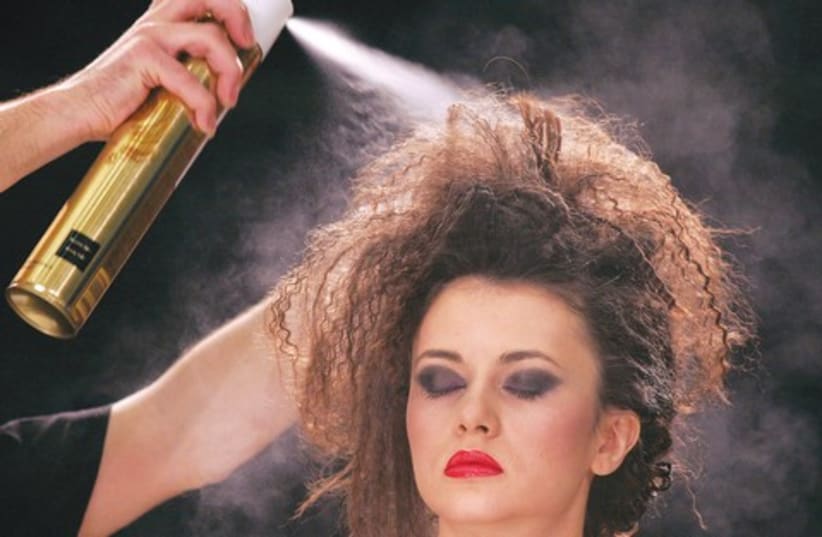Judy Siegel-Itzkovich comments: The Health Ministry indeed issued a warning to the public in March 2010 against the use of a number of preparations for hair straightening made in China and Brazil that contained excessive amounts of formaldehyde. It said it is working to cancel the products’ licenses.But last week, the ministry told The Jerusalem Post that it has not approved and does not recommend the use of any hairstraightening product containing any amount of formaldehyde, as it not only irritates the skin and stimulates allergic reactions but can cause cancer.The ministry said that some salons use “hair-masking” products for hair straightening but add other ingredients, apparently including formaldehyde. The ministry urged the public to request written material about what is being used for hair-straightening in salons and make sure that illegal chemicals have not been added.The ministry approves or rejects cosmetics, but it is the Industry, Trade and Employment Ministry that is responsible for supervising and monitoring hair salons.Formaldehyde is a colorless, usually strong-smelling chemical that has been in use for about seven decades as a preservative and binding agent. In its annual report on carcinogens recently, the US National Toxicology Program reclassified formaldehyde from a “probable carcinogen” to a known one. In the US, the Occupational and Health Safety Administration investigated hair straightening products used in hair salons and found that some labeled “formaldehyde-free” actually contained amounts of the chemical that were above its limits, less than 0.2 percent.It was concerned not only about the users of the product but also the hairdressers who applied it to their customers’ heads. The chemical is released into the air when a hairstylist dries with a blower or iron the hair of a customer who has undergone straightening treatment. Such hair products have been banned in Canada, Australia and Europe.I am 54 years old and have for the last 10 years suffered from tinnitus – I hear constant noise in my ears that doesn’t really exist. I suppose it’s my own fault, as I used to play in a band and perform at events, including weddings, which we did at a high decibel level; this is a frequent cause of tinnitus.
I was told when it was diagnosed that there isn’t much that can be done for my condition except to “ignore it” or turn on the radio low to create white noise, but it hasn’t helped. Is there any new treatment? H.B., Tel AvivHaya Levi, communications specialist and head of the audiology department at Hadassah- University Medical Center in Jerusalem’s Ein Kerem, replies:Tinnitus is defined as noise in one’s ears that does not come from an exterior source. Many factors along the length of the hearing canal can be responsible for it. Thus it can result from various problems, so one must undergo examination by an ear-noseand- throat specialist and comprehensive hearing tests by a communications specialist. If necessary, the ENT specialist will refer the patient for additional tests, after which it will be clear whether the problem can be treated with medication or surgery.But there are cases in which drugs and surgery do not help. In these cases, there are treatments that make possible a better quality of life.The latest treatment, called TRT (tinnitus retraining therapy) teaches the brain to regard tinnitus as a neutral sound so that the noise will not disturb the patient so much. It is performed individually and takes about a year.TRT was developed in the late 1980s by Yale University’s Dr. Pawel Jastreboff, who believed that the limbic (emotional) and autonomic nervous systems are involved in the perception of tinnitus.The sufferers are taught to treat the noise from tinnitus like any other sound that they get used to, such as that of the motor of a refrigerator that periodically turns itself on. Thus there is habituation to and a reduction in neuronal response to the irrelevant signals.This results in continuous changes in the connections within the brain involved in transmitting signals from the ear to the brain, filtering out the habituated noises. The treatment includes the use of “sound generators” worn in the ear to create a neutral sound while “reprogramming” the brain not to notice the tinnitus.Combined hypnosis and medications are also a possible therapy.Until you get treatment and your hearing has been shown to decline, you can use a hearing aid, which can reduce the amount of noise resulting from your condition. Most people complain that tinnitus bothers them more in a quiet environment and even makes it difficult for them to go to sleep. As you wrote, white noise from music or the radio played softly in the background can help to reduce the disturbance.Rx for Readers welcomes queries from readers about medical problems. Experts will answer those we find most interesting. Write Rx for Readers, The Jerusalem Post, POB 81, Jerusalem 91000, fax your question to Judy Siegel-Itzkovich at (02) 538-9527, or e-mail it to jsiegel@jpost.com, giving your initials, age and place of residence.
